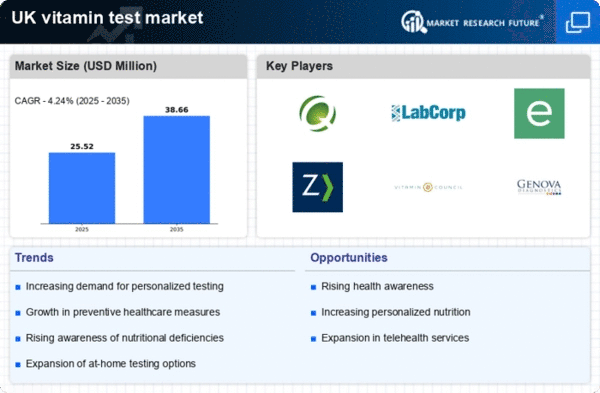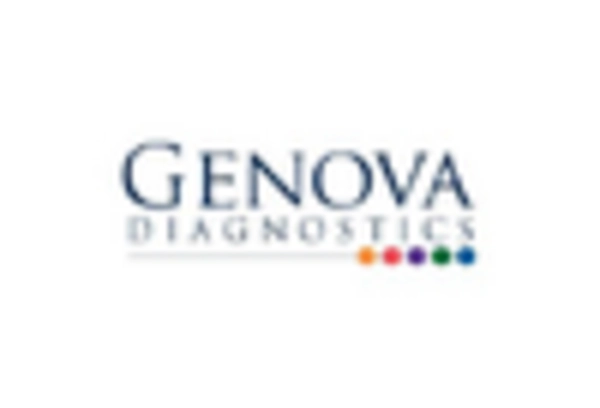Increased Health Consciousness
The vitamin test market in the UK is experiencing growth due to heightened health consciousness among consumers. Individuals are increasingly prioritising their health and wellness, leading to a surge in demand for vitamin testing services. According to recent surveys, approximately 70% of UK adults express a desire to monitor their nutritional status regularly. This trend is likely to drive the vitamin test market as consumers seek to identify deficiencies and optimise their health. Furthermore, the rise of social media and health influencers has amplified awareness regarding the importance of vitamins, encouraging more individuals to consider testing as a proactive measure. As a result, the vitamin test market is poised for expansion, with an increasing number of companies offering innovative testing solutions to cater to this growing demand.
Regulatory Support and Guidelines
The vitamin test market in the UK benefits from supportive regulatory frameworks that promote health testing. Government initiatives aimed at improving public health have led to the establishment of guidelines for nutritional testing. For instance, the UK government has been actively encouraging preventive healthcare measures, which include regular vitamin testing. This regulatory support is likely to enhance consumer trust in testing services, thereby driving market growth. Additionally, the National Health Service (NHS) has been integrating vitamin testing into routine health assessments, further legitimising the vitamin test market. As more individuals become aware of these services, the market is expected to expand, with an increasing number of healthcare providers offering vitamin testing as part of their services.
Growing Interest in Holistic Health
The vitamin test market is benefiting from a growing interest in holistic health approaches among UK consumers. This trend reflects a shift towards viewing health as a comprehensive concept that encompasses physical, mental, and emotional well-being. As individuals seek to understand the interconnectedness of their health, the demand for vitamin testing services is likely to increase. Research indicates that approximately 65% of consumers in the UK are now exploring holistic health solutions, which often include nutritional assessments. This growing interest is expected to drive the vitamin test market as consumers look for ways to enhance their overall well-being through informed dietary choices. Furthermore, the rise of wellness communities and holistic health practitioners is likely to further promote the importance of vitamin testing in achieving optimal health.
Technological Integration in Testing
The integration of advanced technology in the vitamin test market is transforming how consumers access testing services. Innovations such as at-home testing kits and mobile applications are making vitamin testing more accessible and convenient. Recent data indicates that the market for home health testing kits in the UK has grown by over 30% in the past year, reflecting a shift towards self-monitoring health. This technological advancement allows consumers to take control of their health, potentially increasing the demand for vitamin testing services. Moreover, the use of artificial intelligence in analysing test results is enhancing the accuracy and reliability of vitamin assessments. As technology continues to evolve, the vitamin test market is likely to see further growth, driven by consumer preferences for convenient and efficient health solutions.
Rising Demand for Preventive Healthcare
The vitamin test market is witnessing a surge in demand for preventive healthcare services in the UK. As individuals become more aware of the benefits of early detection of nutritional deficiencies, the inclination towards preventive testing is increasing. Reports suggest that nearly 60% of UK adults are now opting for preventive health measures, including vitamin testing, to maintain optimal health. This trend is likely to propel the vitamin test market forward, as consumers seek to avoid potential health issues through proactive measures. Additionally, the increasing prevalence of lifestyle-related health conditions has prompted a greater focus on nutrition, further driving the demand for vitamin testing services. Consequently, the vitamin test market is expected to expand as more individuals prioritise preventive health strategies.
















